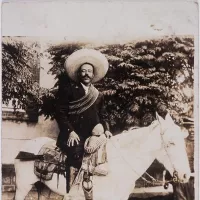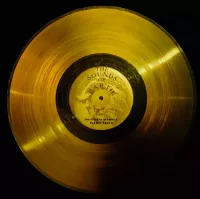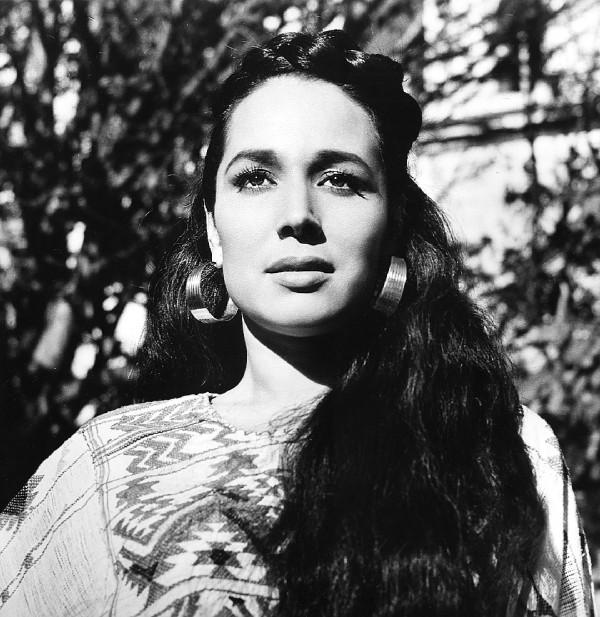Flor Silvestre, born Guillermina Jiménez Chabolla, was a renowned Mexican singer and actress with a career spanning over seven decades. A prominent figure in Mexican and Latin American music, she achieved stardom during the Golden Age of Mexican cinema. Her diverse career encompassed various entertainment forms including films, television, radio, stage productions, and musical recordings.
1906: Birth of María de Jesús Chabolla Peña
Flor Silvestre's mother, María de Jesús Chabolla Peña, was born in 1906.
August 1930: Birth of Guillermina Jiménez Chabolla
Guillermina Jiménez Chabolla was born in August 1930 in Salamanca, Guanajuato, Mexico.
August 1930: Birth of Flor Silvestre
Guillermina Jiménez Chabolla, later known as Flor Silvestre, was born in Salamanca, Guanajuato, Mexico in August 1930.
1943: Start of Singing Career
At the age of 13, Flor Silvestre began her singing career in 1943 after impressing audiences at the Teatro del Pueblo.
1943: The Naming of Flor Silvestre
In 1943, journalist Arturo Blancas suggested the stage name "Flor Silvestre", inspired by a Dolores del Río film, and it stuck.
December 1945: "Soul of Ranchera Song"
During a performance at Guadalajara's Coliseo Olímpico in December 1945, Flor Silvestre was announced as "Flor Silvestre, the Soul of Ranchera Song".
1945: Flor Silvestre: "Alma de la Canción Ranchera"
In 1945, Flor Silvestre was recognized as the "Alma de la Canción Ranchera" ("Soul of Ranchera Song").
November 1946: Performance at Inauguration of Juárez Movie Theater
Flor Silvestre was invited to perform at the inauguration of Guadalajara's Juárez movie theater in November 1946.
1947: Beginning of Central and South American Tour
Flor Silvestre embarked on a tour across Central and South America in 1947, performing at renowned nightclubs.
1949: Conclusion of Central and South American Tour
Flor Silvestre's Central and South American tour concluded in 1949 upon her return to Mexico.
1949: Film Debut in "Te besaré en la boca"
In 1949, Flor Silvestre embarked on her film career with a singing role in the movie "Te besaré en la boca." This marked her entry into the world of cinema.
February 1950: ¡A los toros! Revue
In February 1950, Flor Silvestre participated in the revue ¡A los toros! at Teatro Tívoli, a show about bullfighting. The revue was written and presented by Paco Malgesto, who would later become her second husband. In the show, she showcased her talent by singing Mexican musical numbers related to bullfights.
1950: Breakthrough at El Patio and Subsequent Success
After returning from South America in 1950, Flor Silvestre's performances at Mexico City's El Patio nightclub caught the attention of industry giants, leading to her radio program "Increíble pero cierto" and a five-film contract.
1950: Film Debut in "Primero soy mexicano"
Flor Silvestre began her film career in 1950 with her debut in "Primero soy mexicano", directed by and co-starring Joaquín Pardavé.
1950: First Recordings and Formation of "Las Flores"
Flor Silvestre recorded her first songs for Columbia Records in 1950, marking the beginning of her successful recording career. She also formed the duet "Las Flores" with her sister, La Prieta Linda.
1950: First Recordings with Mexican Columbia Label
Flor Silvestre's musical journey began in 1950 when she made her first recordings with the Mexican Columbia label. Backed by renowned mariachi musicians, these early recordings laid the foundation for her successful career.
1950: Rise to Radio Stardom and "Reina de la Canción Mexicana"
Flor Silvestre's radio career took off in 1950, earning her the title "Reina de la Canción Mexicana" ("Queen of Mexican Song").
1950: First Leading Role in "Primero soy mexicano"
In 1950, Flor Silvestre secured her first leading role in the film "Primero soy mexicano." Produced by Walerstein, the movie also starred Joaquín Pardavé, who wrote and directed it, along with Luis Aguilar and Francisco "Charro" Avitia.
1951: Starring in "El tigre enmascarado"
In 1951, Flor Silvestre appeared in the film "El tigre enmascarado," where she reunited with her "Primero soy mexicano" co-stars, Luis Aguilar and Francisco Avitia.
1952: Leading Lady in Dagoberto Rodríguez Film Trilogy
In 1952, Flor Silvestre took on the role of leading lady alongside actor Dagoberto Rodríguez in a film trilogy. The trilogy comprised "El lobo solitario," "La justicia del lobo," and "Vuelve el lobo."
1953: Marriage to Francisco Rubiales Calvo
Around 1953, Flor Silvestre married Francisco Rubiales Calvo, a radio announcer and bullfighting chronicler who later rose to fame as a television presenter.
July 1955: Starring in "La hacienda de Carrillo" Stage Play
On July 1, 1955, Flor Silvestre took to the stage as one of the stars in the play "La hacienda de Carrillo." This revue premiered at the newly established Teatro Ideal. The play, penned by Carlos M. Ortega and Pablo Prida, centered around a hacienda in rural Mexico, whose owner decides to leave his land behind to pursue a career in politics, becoming a deputy and venturing into the bustling metropolis accompanied by his daughters.
1955: First Color Film: "La doncella de piedra"
In a groundbreaking moment in 1955, Flor Silvestre starred in her first color film, "La doncella de piedra." Notably, this film was among the early Mexican CinemaScope productions. Adapted from Rómulo Gallegos' novel "Sobre la misma tierra," the movie featured Flor Silvestre as Cantaralia Barroso, the mother of the story's central character, Remota Montiel, played by Elsa Aguirre.
1955: Singing on "Su programa Calmex" Radio Show
In early 1955, Flor Silvestre's talent graced the airwaves as she lent her voice to the XEW radio program, "Su programa Calmex," sponsored by Calmex Sardines. Sharing the program with other notable entertainers like Miguel Aceves Mejía, the Trío Tariácuri, and the Hermanitas de Alba, she captivated audiences with her musical prowess.
1957: Debut Single "Cielo rojo" and Television Debut
1957 marked a significant year for Flor Silvestre's career. RCA Victor released her debut single, "Cielo rojo," a song that would rise to become one of her signature tracks. The single, which featured "¡Qué padre es la vida!" as its B-side, quickly gained popularity. Adding to her list of achievements, she made her television debut on Mother's Day 1957 with a memorable performance in the television play "Secreto de familia," sharing the screen with Sara García and Miguel Arenas. She also landed a famous role as Leonor, the mother of Cantinflas' godson, in the acclaimed Eastmancolor comedy "El bolero de Raquel."
1957: Signing with Musart Records
Flor Silvestre joined Musart Records in 1957, becoming one of their most successful artists with numerous hit singles.
1957: Musical Performances in "La virtud desnuda"
In 1957, Flor Silvestre joined a constellation of stars, including Agustín Lara, Pedro Vargas, and Rosa de Castilla, to deliver captivating musical performances for the film "La virtud desnuda." Produced by Calderón Films, the movie starred Columba Domínguez and showcased the musical talents of these renowned artists.
1957: Starring Role in "El bolero de Raquel"
In 1957, Flor Silvestre starred alongside Cantinflas in the film "El bolero de Raquel".
1957: Recordings with RCA Víctor, Including First Version of "Cielo rojo"
In 1957, Flor Silvestre ventured into the world of recording with RCA Víctor, releasing a single that featured her debut recording of the iconic song "Cielo rojo" on side A, coupled with "Qué padre es la vida" on side B.
1957: Signing with Musart Label and Soundtrack Recordings
The year 1957 marked a pivotal moment in Flor Silvestre's recording career as she signed a contract with the Musart label. Among her early recordings for Musart were contributions to the soundtracks of films like the Heraclio Bernal series and "La cucaracha."
1958: Debut Album "Flor Silvestre" Released
Around 1958, Flor Silvestre's debut album, aptly titled "Flor Silvestre," was released. This marked the beginning of her recorded music career. The album featured a collection of her early Musart hits, including "El ramalazo," "¡Qué bonito amor!," "La flor de la canela," "Échame a mí la culpa," "Ay el amor," "Lágrimas del alma," and "Amémonos."
1958: Separation from Francisco Rubiales Calvo
Flor Silvestre and Francisco Rubiales Calvo's paths diverged in 1958 when they separated and began divorce proceedings.
1958: Release of Debut Studio Album with Musart, "Flor Silvestre"
In 1958, Flor Silvestre released her first studio album under the Musart label, aptly titled "Flor Silvestre." This marked the beginning of a prolific relationship with the label, resulting in a vast catalog of recordings.
1959: Notable Role in "La cucaracha"
Flor Silvestre had an important role in the 1959 film "La cucaracha", directed by Ismael Rodríguez.
1959: First Top Billing in "Pueblo en armas"
In 1959, Flor Silvestre achieved a career milestone by receiving top billing for the first time in the film "Pueblo en armas." This marked a significant step forward in her acting career, giving her greater prominence and recognition.
1959: Supporting Role in "La cucaracha" and Soundtrack Contribution
In 1959, Flor Silvestre showcased her acting skills alongside the legendary María Félix in Ismael Rodríguez's epic Mexican Revolution film, "La cucaracha." Taking on a supporting role, she contributed to the film's powerful storytelling. Beyond her on-screen performance, she lent her voice to the film's soundtrack, recording "Te he de querer," "La chancla," and "La Valentina" for the album "La cucaracha: Música de la película," released by Musart Records.
1960: Top Billing in "¡Viva la soldadera!"
Continuing her success from the previous year, Flor Silvestre once again received top billing in the 1960 sequel, "¡Viva la soldadera!" Both films were directed by Miguel Contreras Torres and showcased her talent in leading roles.
1960: Starring in "Dos locos en escena" with Viruta and Capulina
In 1960, Flor Silvestre shared the screen with the renowned comedy duo Viruta and Capulina in the film "Dos locos en escena." Her collaboration with these iconic comedians added a comedic touch to her repertoire.
1961: Re-recording of "Cielo rojo" and Second Album Release
In 1961, Flor Silvestre revisited her hit song "Cielo rojo," re-recording it for Musart with the accompaniment of Pepe Villa's Mariachi México. This new rendition also achieved significant success, becoming the opening track of her second Musart album, "Flor Silvestre con el Mariachi México." This album further solidified her presence in the music industry, featuring early 1960s hits such as "Pa' todo el año," "Renunciación," "Desolación," "El peor de los caminos," "Aquel inmenso amor," and "Para morir iguales."
1962: Role in Academy Award-Nominated Film "Ánimas Trujano"
Flor Silvestre starred in the 1962 film "Ánimas Trujano", which was nominated for an Academy Award for Best Foreign Language Film.
1962: Starring in Oscar-Nominated Film "Ánimas Trujano"
In 1962, Flor Silvestre took on a significant role as Catalina, a captivating and alluring flirt, in the critically acclaimed drama "Ánimas Trujano." The film, starring Toshiro Mifune and Columba Domínguez, garnered an Oscar nomination and won a Golden Globe award. This marked her second collaboration with director Ismael Rodríguez, following her supporting role in "La cucaracha."
December 1964: Ranked Among Top Mexican Folk Singers
In December 1964, Flor Silvestre's musical achievements were recognized when Cashbox, a prominent music industry publication, ranked her among the top ten Mexican folk singers of the year. This accolade solidified her position as a leading figure in the genre.
1964: Release of Greatest Hits Album, "Flor Silvestre canta sus éxitos"
In 1964, Columbia's subsidiary label, Okeh, released "Flor Silvestre canta sus éxitos," a compilation album that brought together ten of her early recordings, originally released as 78 rpm singles.
1972: Release of Three Albums, Including Tribute Album and Bolero Collection
In 1972, Flor Silvestre was busy releasing three albums. "Una gran intérprete y dos grandes compositores" paid tribute to songwriters Cornelio Reyna and Ferrusquilla, while "Canciones con alma" showcased her love for bolero music. The third album, "La voz que acaricia," featured hits like "Solo con las estrellas" and "Hastío."
1973: Acting in "La muerte de Pancho Villa" and Release of First Norteño Album
In 1973, Flor Silvestre took on the role of one of Pancho Villa's lovers in the film "La muerte de Pancho Villa." This year also marked her foray into norteño music with the release of her album "La onda norteña de Flor Silvestre." The album cover featured her in character from the film.
1974: Release of Tribute Album to Puerto Rican Songwriters and Appearance in "Mi aventura en Puerto Rico"
1974 saw Flor Silvestre release "Con todo mi amor a mi lindo Puerto Rico," an album honoring Puerto Rican songwriters Rafael Hernández and Pedro Flores. She also starred in the film "Mi aventura en Puerto Rico," where she captivated audiences with her renditions of "Desvelo de amor" and "Obsesión."
1974: Portrayal of Isabel Palma in "Peregrina"
In 1974, Flor Silvestre graced the screen as Isabel Palma, the wife of Felipe Carrillo Puerto, in the film "Peregrina." She showcased her vocal talents by singing the Guty Cárdenas bolero "Quisiera" in the film.
1975: Performances in "Simón Blanco" and "Don Herculano enamorado"
In 1975, Flor Silvestre showcased her versatility by singing "La palma" in the film "Simón Blanco" and playing the female lead in "Don Herculano enamorado."
1977: Lead Role in "El moro de cumpas"
Flor Silvestre further solidified her acting career in 1977 by taking on the female lead in the film "El moro de cumpas."
1978: Release of "Ahora sí va en serio" Featuring Joan Sebastian's Compositions
Flor Silvestre's 1978 album "Ahora sí va en serio" marked a collaboration with renowned songwriter Joan Sebastian, featuring several of his compositions. The title track even earned a spot on the Cashbox Latin Singles to Watch list.
1979: "Morir al lado de mi amor" Featured on Cashbox's Latin Singles to Watch List
Flor Silvestre's single "Morir al lado de mi amor" gained recognition in 1979 by being included in Cashbox's Latin Singles to Watch list.
1979: Starring in "Mi caballo el cantador"
In 1979, Flor Silvestre graced the screen once again, captivating audiences with her performance as the female lead in the film "Mi caballo el cantador."
1989: First Foray into Banda Music Recording
Breaking new ground in 1989, Flor Silvestre embraced banda music for the first time, recording songs like "Los mirasoles," "La rama," and "Quiero que sepas" with Don Ramón López Alvarado's band.
1990: End of Film Career
Flor Silvestre's film career spanned four decades, ending in 1990.
1990: Final Film Appearance in "Triste recuerdo"
In 1990, Flor Silvestre made her final film appearance in "Triste recuerdo," leaving a lasting legacy in the world of cinema.
1991: Release of First Banda Album, "Flor Silvestre con tambora"
Further solidifying her presence in banda music, Flor Silvestre released her first full-fledged banda album, "Flor Silvestre con tambora," in 1991, which included a banda rendition of her bolero hit "Caricia y herida."
September 1993: Death of María de Jesús Chabolla Peña
Flor Silvestre's mother, María de Jesús Chabolla Peña, passed away in September 1993.
1994: Release of "Me regalo contigo," Featuring a Dedication to Her Marriage and a Vallenato Song
Flor Silvestre's 1994 album "Me regalo contigo" carried special significance as it included "Para siempre juntos," a song dedicated to her marriage with Antonio Aguilar. The album also showcased her versatility with the inclusion of "Sólo para ti," a vallenato song.
2001: Release of Second Banda Album, Featuring New Versions of 1960s Hits
In 2001, Flor Silvestre revisited her musical roots, releasing her second banda album, also titled "Flor Silvestre con tambora." This album breathed new life into her beloved 1960s hits, featuring fresh banda arrangements of classics like "Cariño santo," "Celosa," and "El mar y la esperanza."
2008: Digital Release of Musart Recordings
In 2008, recognizing the enduring legacy of Flor Silvestre, Musart made a significant portion of her recordings available in digital format, ensuring that her music continued to reach a wider audience.
December 2010: Release of "Soledad: canto a mi amado y a su recuerdo," a Tribute to Her Late Husband
December 2010 marked the release of "Soledad: canto a mi amado y a su recuerdo," a poignant album through which Flor Silvestre paid tribute to her late husband, Antonio Aguilar. This heartfelt collection featured previously unrecorded songs that held deep meaning for the beloved singer.
February 2012: Undergoes Surgery to Treat Lung Cancer
In February 2012, Flor Silvestre faced a health challenge, undergoing surgery to remove half of her right lung due to cancer. Thankfully, she responded well to the procedure.
2013: Special Silver Goddess Award
The Association of Mexican Cinema Journalists honored Flor Silvestre with the Special Silver Goddess Award in 2013.
March 2015: Premiere of Documentary "Flor Silvestre: su destino fue querer" at Guadalajara International Film Festival
March 2015 witnessed the premiere of "Flor Silvestre: su destino fue querer," a documentary celebrating her life and career, at the Guadalajara International Film Festival. The film featured interviews with Flor Silvestre herself, her children, and fellow artists, offering an intimate glimpse into the icon's journey.
2016: Collaboration with Son Antonio on "Para morir iguales"
In 2016, Flor Silvestre shared a special musical moment with her son, Antonio Aguilar Jr., by being featured on "Para morir iguales," a track from his album "Caballo viejo."
2016: Remastering and Digital Reissue of "Flor Silvestre canta sus éxitos"
Recognizing the enduring appeal of Flor Silvestre's music, Sony Music Entertainment México remastered and reissued her greatest hits album, "Flor Silvestre canta sus éxitos," in digital format in 2016, introducing her music to a new generation.
November 2020: Death of Flor Silvestre
Flor Silvestre passed away in November 2020 at her home in Villanueva, Zacatecas.
2020: Passing of Flor Silvestre
Flor Silvestre died in 2020.
Mentioned in this timeline
Puerto Rico is a self-governing Caribbean archipelago and an unincorporated...

Sony Group Corporation is a Japanese multinational conglomerate based in...

Guadalajara the capital of Jalisco in western Mexico is a...

Mexico City is the capital and largest city of Mexico...

Pancho Villa was a pivotal figure in the Mexican Revolution...

Music is a cultural universal involving the arrangement of sound...
Trending

16 days ago Prince Harry's Accusations Cause New Royal Family Divisions and Reconciliation Issues

Matthew Mac McClung is an American professional basketball player currently playing for the Orlando Magic in the NBA while also...

4 months ago Bailey Zimmerman Serves Chicken, Announces New Album 'Different Night Same Rodeo'

4 months ago Brie Larson joins 'The Bear' Season 4 cast, unraveling a major mystery.

2 hours ago Sabrina Carpenter & Marcello Hernandez star in 'SNL' promos, teasing her appearance.

2 hours ago Orbán Hails Hungary as Potential Site for Trump-Putin Meeting Amid Ukraine Tensions
Popular

Candace Owens is an American political commentator and author known...

Charlie Kirk is an American right-wing political activist entrepreneur and...

Paula White-Cain is a prominent American televangelist and key figure...

XXXTentacion born Jahseh Dwayne Ricardo Onfroy was a controversial yet...

Chuck Schumer is the senior United States Senator from New...

Greta Thunberg is a Swedish climate activist who gained international...
